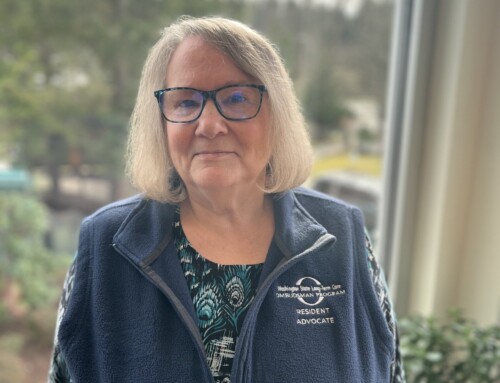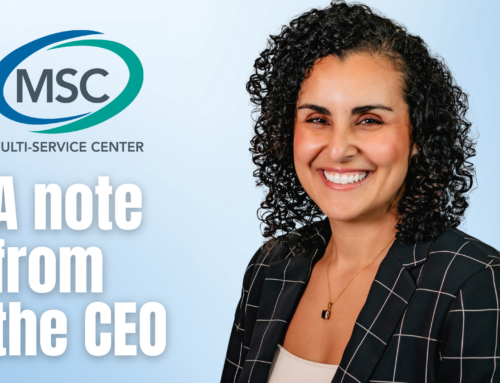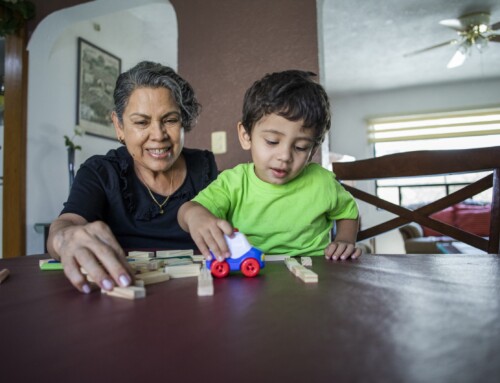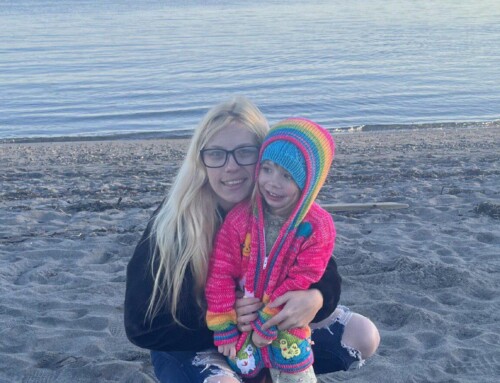Sarah was walking down the hall of the nursing home when a partially opened door caught her eye. She saw the name of a man and a woman on the door that she did not recognize. As a volunteer Long-Term Care Ombuds, she regularly visited residents to make sure their needs were being met and their rights were protected.
As Sarah entered the room, she saw three people in the room. A woman in bed by the window being tended to by a nurse and a man in the bed by the door. They were Michael and Teresina.
When Sarah met them, Michael was legally blind from cataracts and was bedridden because of a lack of muscle tone. Teresina was suffering from cancer and receiving hospice care. Teresina urged Michael to go into therapy and get cataracts surgery. “Teresina was worried about me. She was worried about going into the dying process because of me,” shares Michael.
The next week, Teresina told Sarah that she needed to talk to Michael and to talk with him about Latin. Sarah brought Michael a book in Latin, Winnie the Pooh. Sarah read the book and Michael happily translated. “He was very gracious about interpreting Winnie the Pooh, even though he is a Latin scholar,” shares Sarah.
Michael and Teresina met in the 1960’s in a Tacoma coffee shop where Michael was reading poetry. They shared a passion for the arts—Michael wrote poems and Teresina drew and painted. As they aged, their health declined. One day after they had both fallen down, Teresina made the decision that it was time they both get help and they went to the hospital. After a few days they were transferred to a nursing home.
The transfer was a traumatic experience for Michael. After spending fifty years together, they were separated. Michael wasn’t able to find Teresina. He was distraught and crawled along the floors looking for her. The staff wouldn’t tell him where she was. His doctor decided he was incompetent and started guardian proceedings.
Once he was reunited with Teresina, her hospice nurse figured out what was going on with Michael’s potential guardianship. A guardianship would take away Michael’s ability to make decisions for himself. She knew Michael did not need a guardian, he was in a crisis situation not suffering from dementia, and was able to stop the proceedings from continuing. However, initiation of guardianship proceedings was now on Michael’s medical record and would follow him through the rest of his life. Sarah, in her role as ombuds, helped Michael to have additional information added to his record to discredit the claim of a need for a guardian. This will help Michael to be in control of decisions about his health, finances, and final wishes in the future.
After a few months at the nursing home, Michael lost Teresina; however, he still had Sarah by his side. He was moved into a small room with two other men at the nursing home. He received cataract surgery and physical therapy, but there were issues with his roommates. The staff left the television on 24 hours a day for one of them which made it hard to sleep. He didn’t want to make waves though, and Sarah tried to help where she could in getting him transferred and making the best out of his room situation. About a year after Michael’s arrival at the nursing home, Sarah came back from a vacation to find Michael had been moved to a new facility. The new facility was a vast improvement, it afforded Michael privacy, a space of his own, and most importantly, to decorate all the walls with the artwork of his beloved Teresina.
This new facility was outside her coverage area as an ombuds, however, she had developed such a friendship with Michael, that she decided to start visiting him as a friend. Sarah approached her Staff Ombuds Sam Hopkins. “There’s a layer to volunteering as Ombuds that involves emotions. Additionally, our volunteers build relationships in their roles. I can appreciate this and respect Sarah’s decision. She has my support to continue her friendship off duty,” said Sam.
As Michael’s friend, she visits him often and brings him books in Latin, which Sarah has learned through her friendship with Michael. “We laugh, I really enjoy my visits,” shares Sarah.
“Sarah fed my soul. I don’t think I would have made it without her friendship,” shares Michael. Michael is now under hospice care, and Sarah is there for him. He has shared his final wishes with her and she, as his friend, will remain by his side until that time comes.






